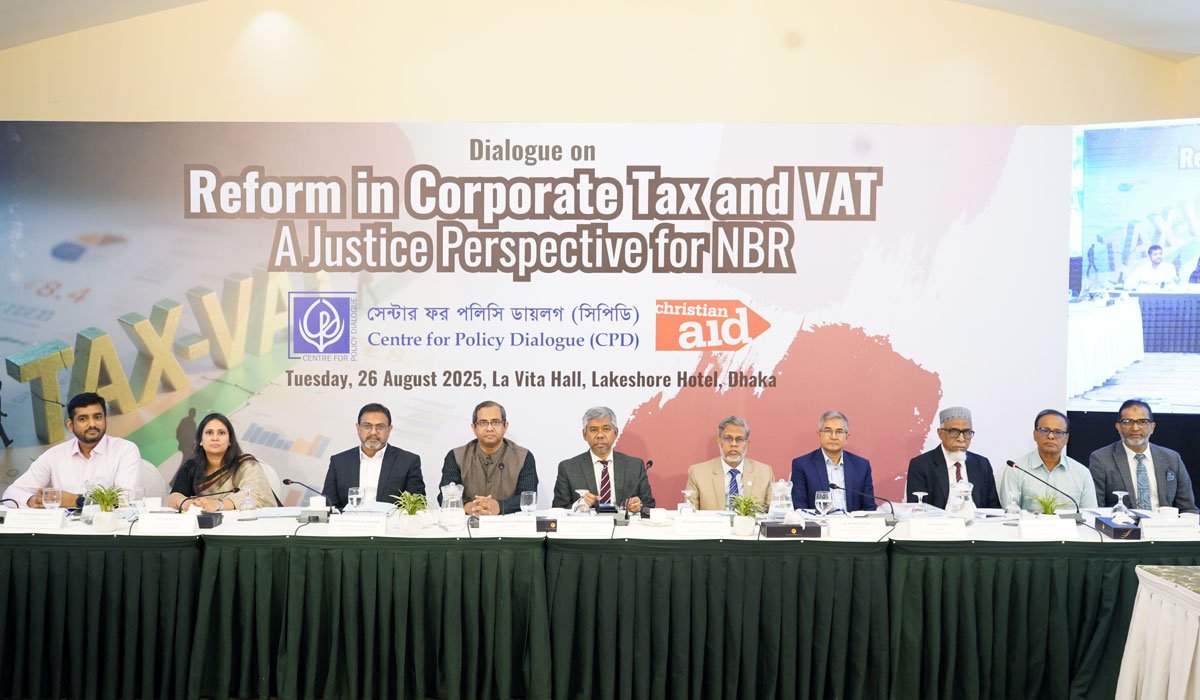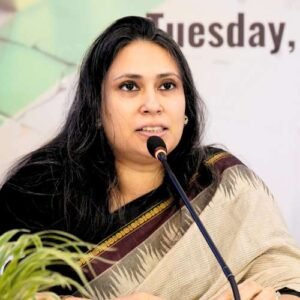
The Value Added Tax (VAT) could be reduced to 10 per cent in Bangladesh without compromising revenue collection. This reduction would help broaden the VAT base, ease the burden on low-income households, lower business costs, and stimulate investment — all critical for Bangladesh as it seeks urgent economic reforms.
These findings were presented at a dialogue titled ‘Reform in Corporate Tax and VAT: A Justice Perspective for NBR’, held on Tuesday, 26 August 2025. Organised by the Centre for Policy Dialogue (CPD) in partnership with Christian Aid Bangladesh, the event brought together policymakers, academics, business leaders, civil society members, and journalists to discuss how to ensure tax justice in the country’s fiscal reforms.

The Chairman of National Board of Revenue (NBR), Mr Md Abdur Rahman Khan FCMA, stated, ‘Our goal is to simplify the tax system, implement a single VAT rate, and promote digital solutions to enhance efficiency and compliance. With collective effort, we can improve the tax-GDP ratio and attract more investment.’
Mr Syed Mushfequr Rahman, Member (VAT Audit) at NBR, highlighted, ‘Our policies are clouded with confusion, and we remain overly reliant on indirect taxes, which does not suit a developing economy. Addressing these issues and implementing full automation is essential for resolving tax evasion and inefficiency.’

Dr Muhammad Abdul Mazid, Chair of the NBR Reform Advisory Committee, emphasised, ‘Tax justice is crucial for our economy, not just for revenue collection, but for ensuring development and avoiding a regressive system. Small enterprises and women entrepreneurs must not be unfairly taxed, and a participatory approach to policy formulation will create a fairer, more transparent system for all.’
Regarding potential tax reforms, Mr Md Abul Basher, Joint Secretary of the Finance Division, Ministry of Finance, suggested, ‘To reduce pressure on tax revenue, we should link higher tuition fees to the income of parents or guardians, similar to the cadet college system. This approach will ease the burden on the government, reduce reliance on tax revenue, and create non-tax revenue sources.’

Mr Farid Uddin, Member of the NBR Reform Advisory Committee, noted, ‘Currently, 80 per cent of our tax revenue comes from indirect taxes, which unfairly impacts the public. To improve investment, we must create an investment-friendly system by integrating VAT, income tax, and customs into a digital platform, increasing compliance and reducing harassment.’
‘Tax reforms must be driven by fairness and accountability,’ said Dr Khondaker Golam Moazzem, Research Director at CPD, while moderating the dialogue. ‘Without justice at the core, reforms will risk becoming regressive and unsustainable.’
In her introductory remarks, Ms Nuzhat Jabin, Country Director of Christian Aid Bangladesh, stressed that progressive taxation is vital as Bangladesh faces rising inequality. She warned that domestic resource mobilisation must not deepen disparities and called for reforms to make revenue generation both efficient and equitable. She also highlighted that tackling tax evasion and avoidance is a more sustainable path than continued reliance on consumption taxes.

Mr Tamim Ahmed, Senior Research Associate at CPD, delivered the keynote presentation, stressing the urgency of addressing tax evasion and leakages to safeguard revenue mobilisation. He recommended lowering the VAT rate to a more competitive level, while strengthening enforcement and compliance. He also suggested phasing out blanket tax incentives for mature industries, directing fiscal support towards emerging sectors and small enterprises, and enhancing institutional transparency through digitalisation.
Mr Md Moshiur Rahman, First Secretary (VAT Supervision and Taxpayer Services) at NBR, spoke about the existing confusion surrounding VAT rates. ‘The special rates for certain products are narrow and lead to confusion. A clearer structure with fewer rate slabs would improve transparency. We need to prioritise increasing the tax base while ensuring compliance. Addressing these issues at the ground level is essential for successful implementation of reforms,’ he said.

Mr A H M Mahbubus Salekin, President of the Dhaka Taxes Bar Association, observed that Bangladeshi citizens are now more willing to pay taxes, with jobholders showing sincerity through initiatives like National Income Tax Day. He added, ‘Businesses remain reluctant due to outdated systems and complex policies. The process must be simplified and backed with incentives so they feel encouraged to comply.’
Mr Mohammad Zahid Hossain FCA, Management Consultant, pointed out that while taxpayers face strict penalties for non-compliance, there are no safeguards against harassment by tax officials. He also mentioned that the VAT system remains overly complex, businesses are taxed even when making losses, and tax refunds are rarely delivered despite existing rules. He stressed the need for a fixed timeline to ensure refunds in cases of advance tax payments.

Mr Aamanur Rahman, Project Director of Women Thrive in Bangladesh, Care Bangladesh, shared concerns about the regressive nature of VAT. He said, ‘While we aim to make VAT more progressive, we must consider its impact on low-income groups. Reconsidering turnover thresholds and focusing on investment-friendly policies, especially in renewable energy, is essential for effective reform.’
The study also recommended reforms to the corporate income tax structure to ensure that statutory rates remain above 15 per cent, in line with global minimum tax commitments. It proposed simplifying the VAT system by consolidating the current eight slabs into three, with the long-term goal of moving towards a two-tier structure. By tackling leakages, improving governance, and embracing digital reforms, the researchers argued, Bangladesh could create a tax system that is both equitable and sustainable as the country moves forward in its post-LDC graduation era.


